Report on Leading and Managing Teams in Health and Social Care Module
VerifiedAdded on 2020/11/23
|6
|1212
|431
Report
AI Summary
This report delves into the core aspects of leading and managing teams within health and social care settings. It explores the features of effective team performance, analyzing challenges faced by developing and established teams, and provides solutions to overcome these obstacles. The report examines the influence of different management styles, methods for building trust and accountability, and approaches to conflict resolution. It also highlights the components of a positive team culture, factors influencing team vision and strategic direction, and the importance of aligning team objectives with individual skills and expertise. The report concludes by addressing strategies for managing team members whose performance does not meet requirements, providing a comprehensive overview of team leadership and management in the health and social care context, and includes references to relevant literature.
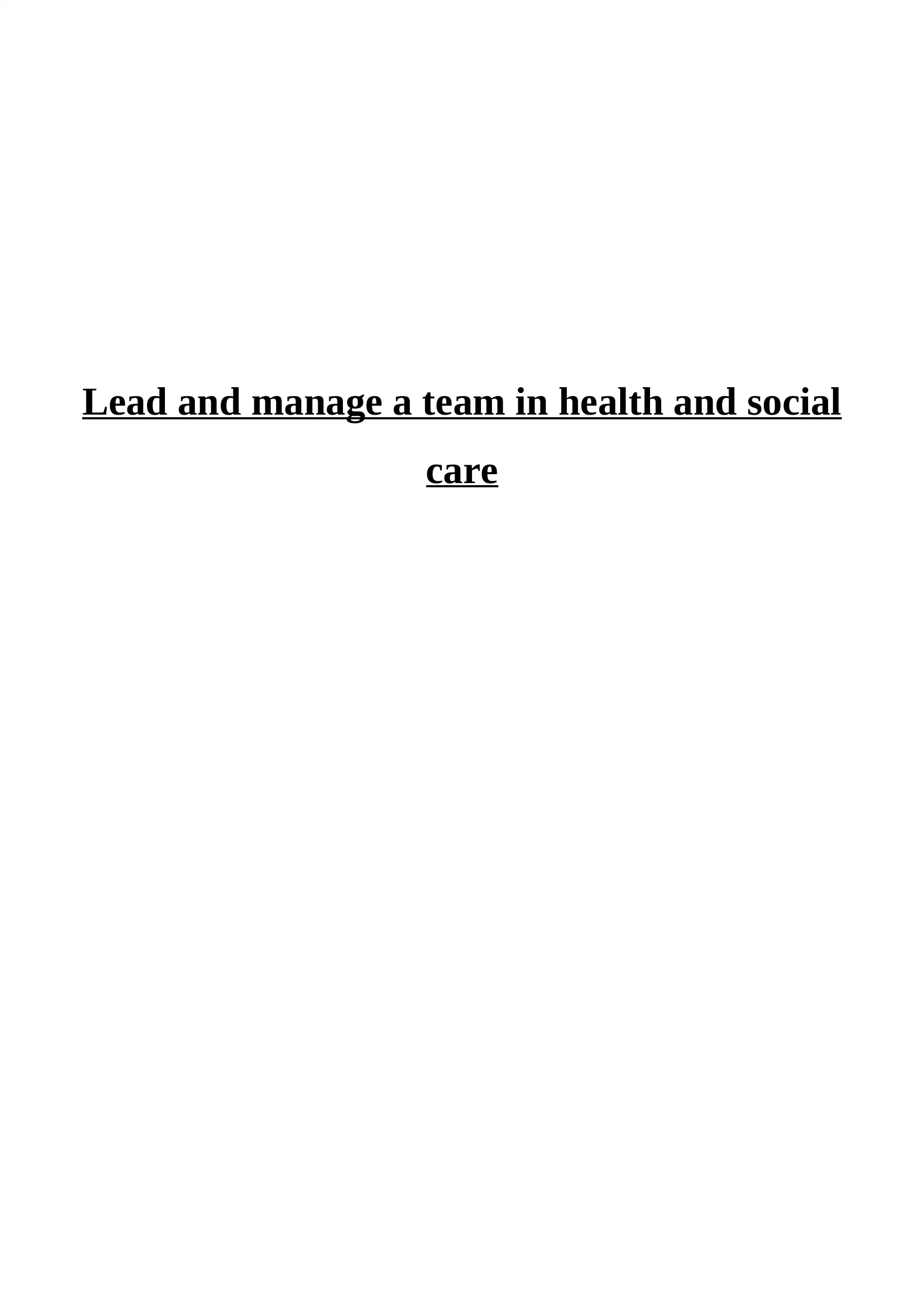
Lead and manage a team in health and social
care
care
Paraphrase This Document
Need a fresh take? Get an instant paraphrase of this document with our AI Paraphraser
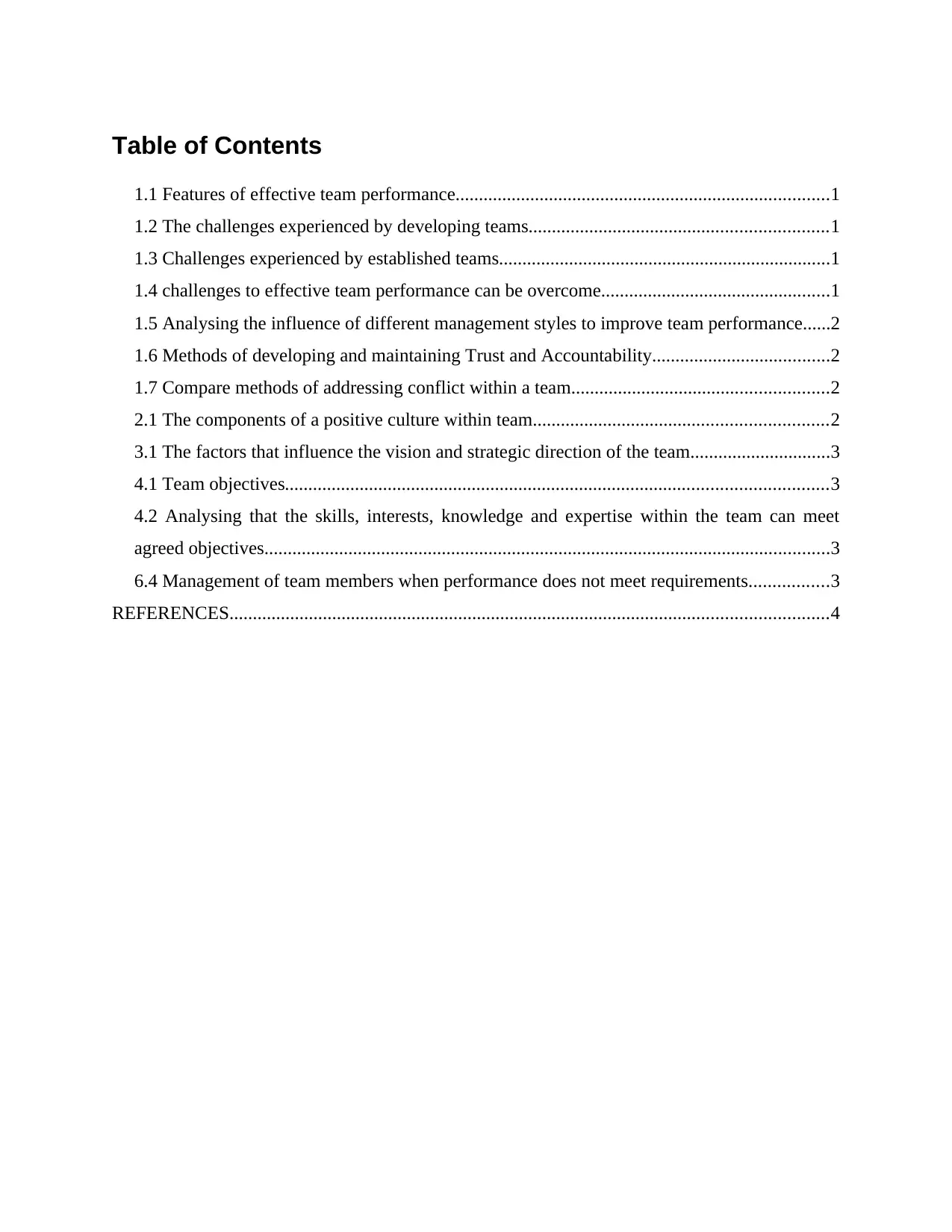
Table of Contents
1.1 Features of effective team performance................................................................................1
1.2 The challenges experienced by developing teams................................................................1
1.3 Challenges experienced by established teams.......................................................................1
1.4 challenges to effective team performance can be overcome.................................................1
1.5 Analysing the influence of different management styles to improve team performance......2
1.6 Methods of developing and maintaining Trust and Accountability......................................2
1.7 Compare methods of addressing conflict within a team.......................................................2
2.1 The components of a positive culture within team...............................................................2
3.1 The factors that influence the vision and strategic direction of the team..............................3
4.1 Team objectives....................................................................................................................3
4.2 Analysing that the skills, interests, knowledge and expertise within the team can meet
agreed objectives.........................................................................................................................3
6.4 Management of team members when performance does not meet requirements.................3
REFERENCES................................................................................................................................4
1.1 Features of effective team performance................................................................................1
1.2 The challenges experienced by developing teams................................................................1
1.3 Challenges experienced by established teams.......................................................................1
1.4 challenges to effective team performance can be overcome.................................................1
1.5 Analysing the influence of different management styles to improve team performance......2
1.6 Methods of developing and maintaining Trust and Accountability......................................2
1.7 Compare methods of addressing conflict within a team.......................................................2
2.1 The components of a positive culture within team...............................................................2
3.1 The factors that influence the vision and strategic direction of the team..............................3
4.1 Team objectives....................................................................................................................3
4.2 Analysing that the skills, interests, knowledge and expertise within the team can meet
agreed objectives.........................................................................................................................3
6.4 Management of team members when performance does not meet requirements.................3
REFERENCES................................................................................................................................4
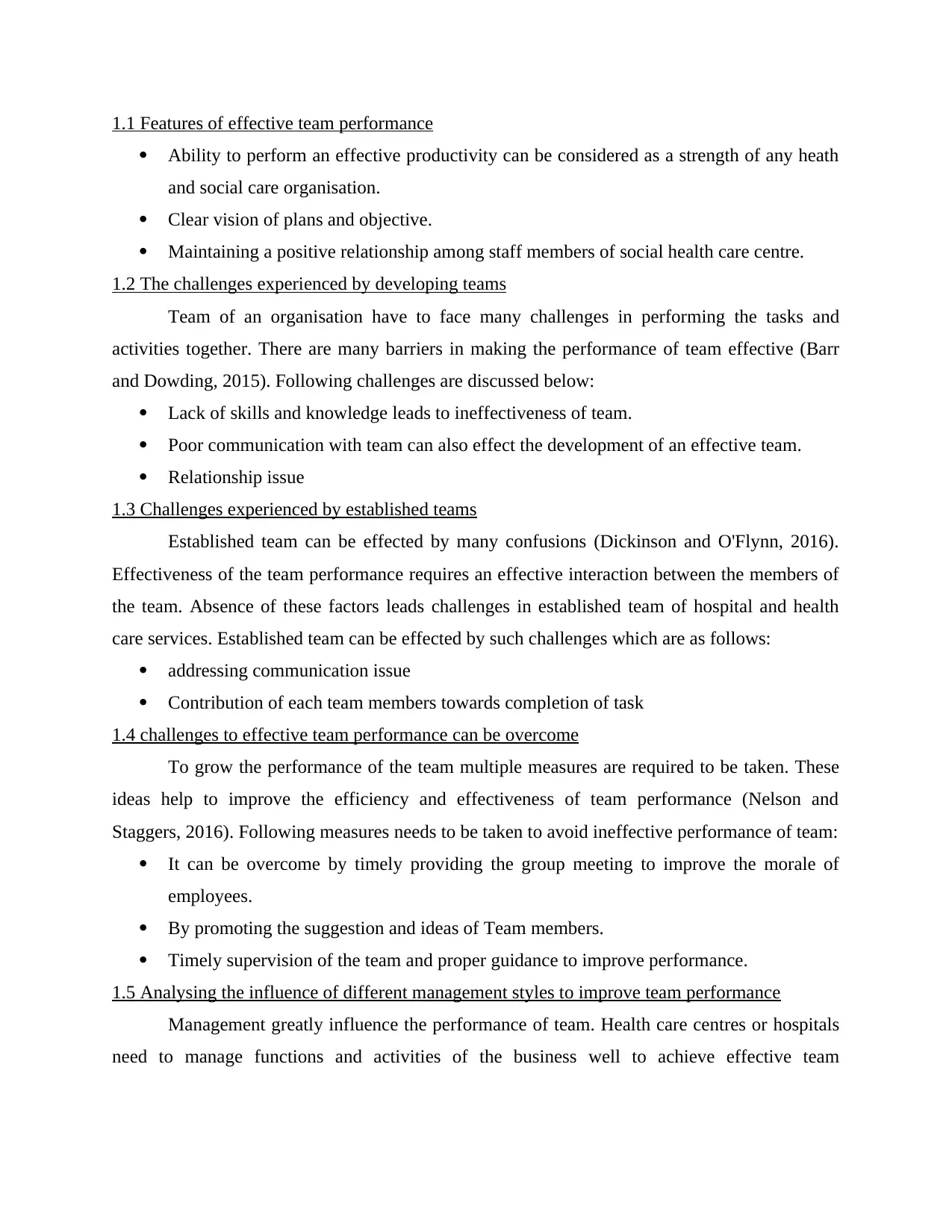
1.1 Features of effective team performance
Ability to perform an effective productivity can be considered as a strength of any heath
and social care organisation.
Clear vision of plans and objective.
Maintaining a positive relationship among staff members of social health care centre.
1.2 The challenges experienced by developing teams
Team of an organisation have to face many challenges in performing the tasks and
activities together. There are many barriers in making the performance of team effective (Barr
and Dowding, 2015). Following challenges are discussed below:
Lack of skills and knowledge leads to ineffectiveness of team.
Poor communication with team can also effect the development of an effective team.
Relationship issue
1.3 Challenges experienced by established teams
Established team can be effected by many confusions (Dickinson and O'Flynn, 2016).
Effectiveness of the team performance requires an effective interaction between the members of
the team. Absence of these factors leads challenges in established team of hospital and health
care services. Established team can be effected by such challenges which are as follows:
addressing communication issue
Contribution of each team members towards completion of task
1.4 challenges to effective team performance can be overcome
To grow the performance of the team multiple measures are required to be taken. These
ideas help to improve the efficiency and effectiveness of team performance (Nelson and
Staggers, 2016). Following measures needs to be taken to avoid ineffective performance of team:
It can be overcome by timely providing the group meeting to improve the morale of
employees.
By promoting the suggestion and ideas of Team members.
Timely supervision of the team and proper guidance to improve performance.
1.5 Analysing the influence of different management styles to improve team performance
Management greatly influence the performance of team. Health care centres or hospitals
need to manage functions and activities of the business well to achieve effective team
Ability to perform an effective productivity can be considered as a strength of any heath
and social care organisation.
Clear vision of plans and objective.
Maintaining a positive relationship among staff members of social health care centre.
1.2 The challenges experienced by developing teams
Team of an organisation have to face many challenges in performing the tasks and
activities together. There are many barriers in making the performance of team effective (Barr
and Dowding, 2015). Following challenges are discussed below:
Lack of skills and knowledge leads to ineffectiveness of team.
Poor communication with team can also effect the development of an effective team.
Relationship issue
1.3 Challenges experienced by established teams
Established team can be effected by many confusions (Dickinson and O'Flynn, 2016).
Effectiveness of the team performance requires an effective interaction between the members of
the team. Absence of these factors leads challenges in established team of hospital and health
care services. Established team can be effected by such challenges which are as follows:
addressing communication issue
Contribution of each team members towards completion of task
1.4 challenges to effective team performance can be overcome
To grow the performance of the team multiple measures are required to be taken. These
ideas help to improve the efficiency and effectiveness of team performance (Nelson and
Staggers, 2016). Following measures needs to be taken to avoid ineffective performance of team:
It can be overcome by timely providing the group meeting to improve the morale of
employees.
By promoting the suggestion and ideas of Team members.
Timely supervision of the team and proper guidance to improve performance.
1.5 Analysing the influence of different management styles to improve team performance
Management greatly influence the performance of team. Health care centres or hospitals
need to manage functions and activities of the business well to achieve effective team
⊘ This is a preview!⊘
Do you want full access?
Subscribe today to unlock all pages.

Trusted by 1+ million students worldwide
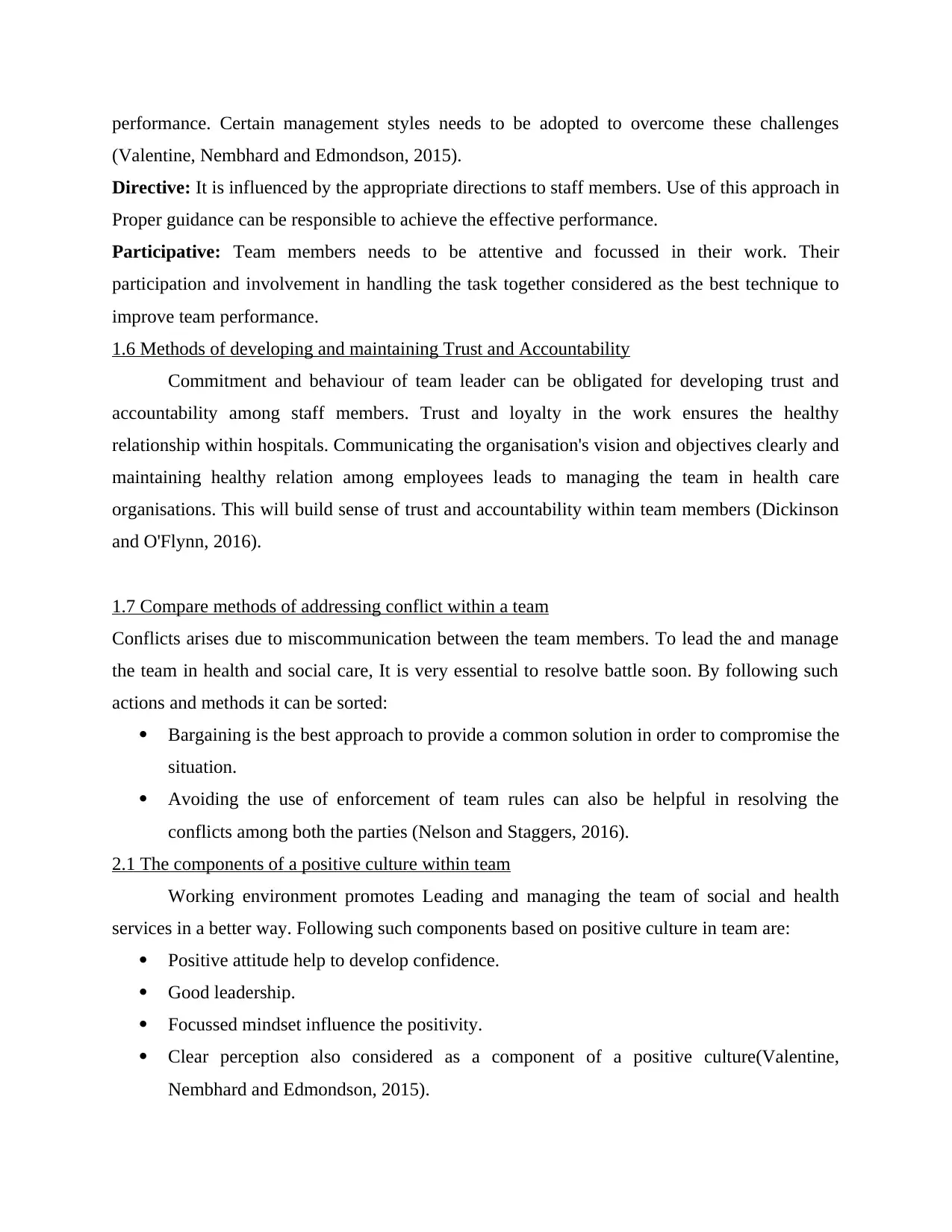
performance. Certain management styles needs to be adopted to overcome these challenges
(Valentine, Nembhard and Edmondson, 2015).
Directive: It is influenced by the appropriate directions to staff members. Use of this approach in
Proper guidance can be responsible to achieve the effective performance.
Participative: Team members needs to be attentive and focussed in their work. Their
participation and involvement in handling the task together considered as the best technique to
improve team performance.
1.6 Methods of developing and maintaining Trust and Accountability
Commitment and behaviour of team leader can be obligated for developing trust and
accountability among staff members. Trust and loyalty in the work ensures the healthy
relationship within hospitals. Communicating the organisation's vision and objectives clearly and
maintaining healthy relation among employees leads to managing the team in health care
organisations. This will build sense of trust and accountability within team members (Dickinson
and O'Flynn, 2016).
1.7 Compare methods of addressing conflict within a team
Conflicts arises due to miscommunication between the team members. To lead the and manage
the team in health and social care, It is very essential to resolve battle soon. By following such
actions and methods it can be sorted:
Bargaining is the best approach to provide a common solution in order to compromise the
situation.
Avoiding the use of enforcement of team rules can also be helpful in resolving the
conflicts among both the parties (Nelson and Staggers, 2016).
2.1 The components of a positive culture within team
Working environment promotes Leading and managing the team of social and health
services in a better way. Following such components based on positive culture in team are:
Positive attitude help to develop confidence.
Good leadership.
Focussed mindset influence the positivity.
Clear perception also considered as a component of a positive culture(Valentine,
Nembhard and Edmondson, 2015).
(Valentine, Nembhard and Edmondson, 2015).
Directive: It is influenced by the appropriate directions to staff members. Use of this approach in
Proper guidance can be responsible to achieve the effective performance.
Participative: Team members needs to be attentive and focussed in their work. Their
participation and involvement in handling the task together considered as the best technique to
improve team performance.
1.6 Methods of developing and maintaining Trust and Accountability
Commitment and behaviour of team leader can be obligated for developing trust and
accountability among staff members. Trust and loyalty in the work ensures the healthy
relationship within hospitals. Communicating the organisation's vision and objectives clearly and
maintaining healthy relation among employees leads to managing the team in health care
organisations. This will build sense of trust and accountability within team members (Dickinson
and O'Flynn, 2016).
1.7 Compare methods of addressing conflict within a team
Conflicts arises due to miscommunication between the team members. To lead the and manage
the team in health and social care, It is very essential to resolve battle soon. By following such
actions and methods it can be sorted:
Bargaining is the best approach to provide a common solution in order to compromise the
situation.
Avoiding the use of enforcement of team rules can also be helpful in resolving the
conflicts among both the parties (Nelson and Staggers, 2016).
2.1 The components of a positive culture within team
Working environment promotes Leading and managing the team of social and health
services in a better way. Following such components based on positive culture in team are:
Positive attitude help to develop confidence.
Good leadership.
Focussed mindset influence the positivity.
Clear perception also considered as a component of a positive culture(Valentine,
Nembhard and Edmondson, 2015).
Paraphrase This Document
Need a fresh take? Get an instant paraphrase of this document with our AI Paraphraser
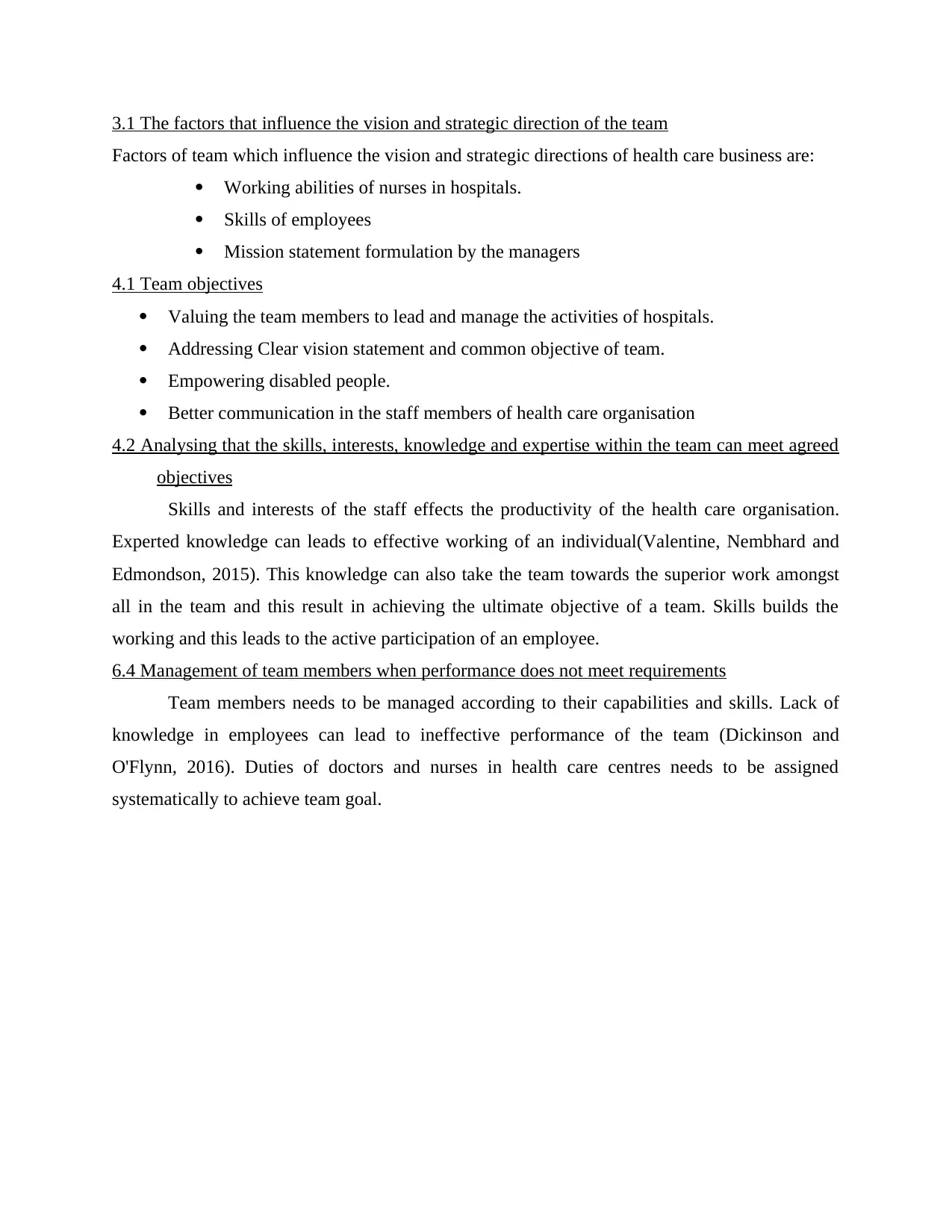
3.1 The factors that influence the vision and strategic direction of the team
Factors of team which influence the vision and strategic directions of health care business are:
Working abilities of nurses in hospitals.
Skills of employees
Mission statement formulation by the managers
4.1 Team objectives
Valuing the team members to lead and manage the activities of hospitals.
Addressing Clear vision statement and common objective of team.
Empowering disabled people.
Better communication in the staff members of health care organisation
4.2 Analysing that the skills, interests, knowledge and expertise within the team can meet agreed
objectives
Skills and interests of the staff effects the productivity of the health care organisation.
Experted knowledge can leads to effective working of an individual(Valentine, Nembhard and
Edmondson, 2015). This knowledge can also take the team towards the superior work amongst
all in the team and this result in achieving the ultimate objective of a team. Skills builds the
working and this leads to the active participation of an employee.
6.4 Management of team members when performance does not meet requirements
Team members needs to be managed according to their capabilities and skills. Lack of
knowledge in employees can lead to ineffective performance of the team (Dickinson and
O'Flynn, 2016). Duties of doctors and nurses in health care centres needs to be assigned
systematically to achieve team goal.
Factors of team which influence the vision and strategic directions of health care business are:
Working abilities of nurses in hospitals.
Skills of employees
Mission statement formulation by the managers
4.1 Team objectives
Valuing the team members to lead and manage the activities of hospitals.
Addressing Clear vision statement and common objective of team.
Empowering disabled people.
Better communication in the staff members of health care organisation
4.2 Analysing that the skills, interests, knowledge and expertise within the team can meet agreed
objectives
Skills and interests of the staff effects the productivity of the health care organisation.
Experted knowledge can leads to effective working of an individual(Valentine, Nembhard and
Edmondson, 2015). This knowledge can also take the team towards the superior work amongst
all in the team and this result in achieving the ultimate objective of a team. Skills builds the
working and this leads to the active participation of an employee.
6.4 Management of team members when performance does not meet requirements
Team members needs to be managed according to their capabilities and skills. Lack of
knowledge in employees can lead to ineffective performance of the team (Dickinson and
O'Flynn, 2016). Duties of doctors and nurses in health care centres needs to be assigned
systematically to achieve team goal.
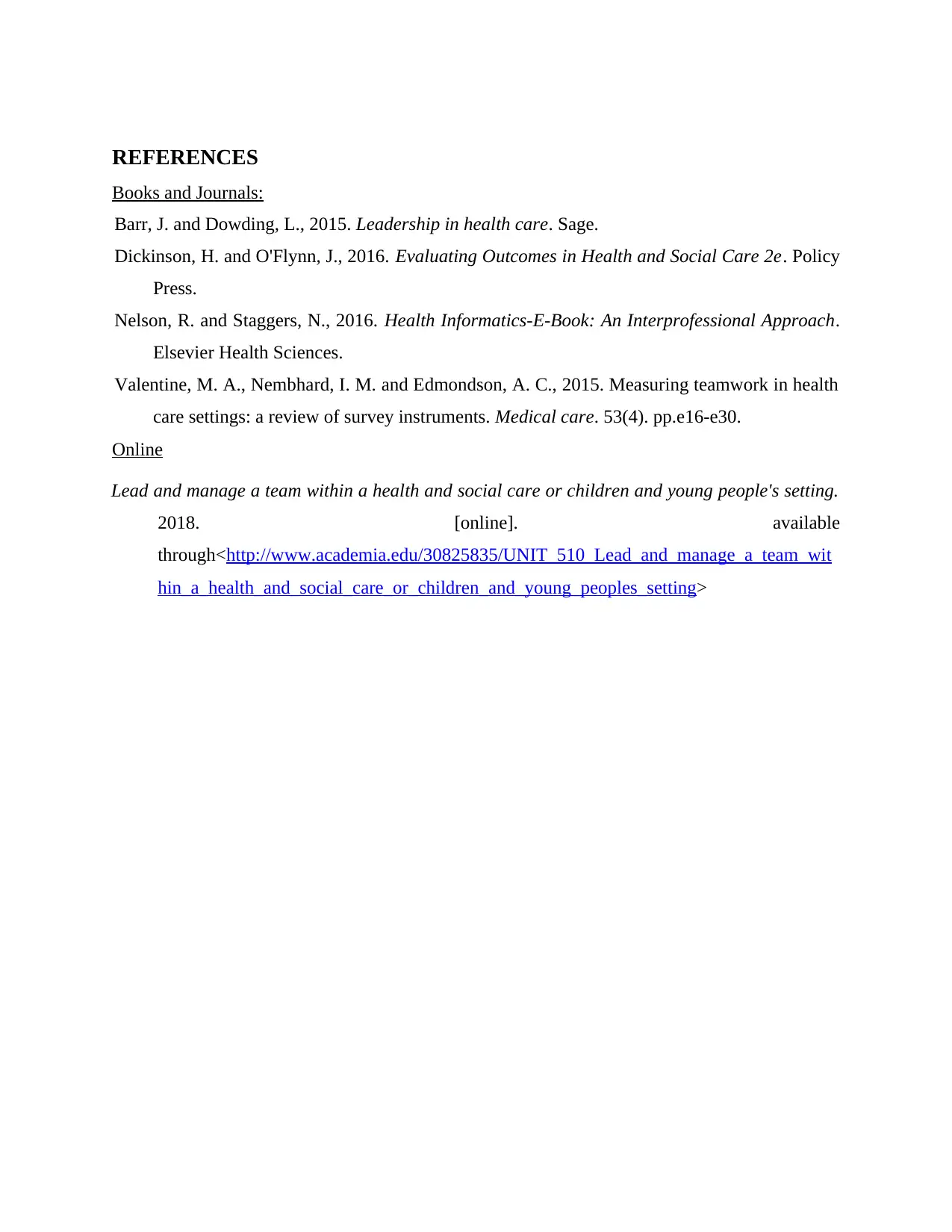
REFERENCES
Books and Journals:
Barr, J. and Dowding, L., 2015. Leadership in health care. Sage.
Dickinson, H. and O'Flynn, J., 2016. Evaluating Outcomes in Health and Social Care 2e. Policy
Press.
Nelson, R. and Staggers, N., 2016. Health Informatics-E-Book: An Interprofessional Approach.
Elsevier Health Sciences.
Valentine, M. A., Nembhard, I. M. and Edmondson, A. C., 2015. Measuring teamwork in health
care settings: a review of survey instruments. Medical care. 53(4). pp.e16-e30.
Online
Lead and manage a team within a health and social care or children and young people's setting.
2018. [online]. available
through<http://www.academia.edu/30825835/UNIT_510_Lead_and_manage_a_team_wit
hin_a_health_and_social_care_or_children_and_young_peoples_setting>
Books and Journals:
Barr, J. and Dowding, L., 2015. Leadership in health care. Sage.
Dickinson, H. and O'Flynn, J., 2016. Evaluating Outcomes in Health and Social Care 2e. Policy
Press.
Nelson, R. and Staggers, N., 2016. Health Informatics-E-Book: An Interprofessional Approach.
Elsevier Health Sciences.
Valentine, M. A., Nembhard, I. M. and Edmondson, A. C., 2015. Measuring teamwork in health
care settings: a review of survey instruments. Medical care. 53(4). pp.e16-e30.
Online
Lead and manage a team within a health and social care or children and young people's setting.
2018. [online]. available
through<http://www.academia.edu/30825835/UNIT_510_Lead_and_manage_a_team_wit
hin_a_health_and_social_care_or_children_and_young_peoples_setting>
⊘ This is a preview!⊘
Do you want full access?
Subscribe today to unlock all pages.

Trusted by 1+ million students worldwide
1 out of 6
Related Documents
Your All-in-One AI-Powered Toolkit for Academic Success.
+13062052269
info@desklib.com
Available 24*7 on WhatsApp / Email
![[object Object]](/_next/static/media/star-bottom.7253800d.svg)
Unlock your academic potential
Copyright © 2020–2026 A2Z Services. All Rights Reserved. Developed and managed by ZUCOL.





